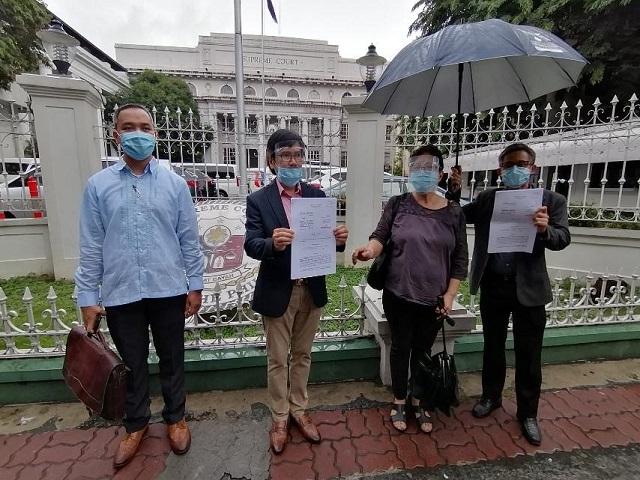People's alliance challenges anti-terrorism law before Supreme Court

A multi-sectoral alliance and party-list organization on Monday challenged the Anti-Terrorism Act of 2020 before the Supreme Court, bringing the number of petitions against the law to eight.
Sanlakas, the petitioner, asked the highest Philippine court to strike down Section 4 of Republic Act No. 11479 as null, void and unconstitutional and to issue a temporary restraining order to prevent its enforcement.
Section 4 defines the crime of terrorism as acts intended to cause, among others, death or serious bodily injury to any person; extensive damage or destruction to a government or public facility, public place, or private property; extensive interference with, damage, or destruction to critical infrastructure — when their purpose is to intimidate the public, create an atmosphere or spread a message of fear, provoke or influence by intimidation the government or any international organization, or seriously destabilize or destroy the fundamental political, economic, or social structures of the country, or create a public emergency or seriously undermine public safety.
Section 4 exempts "advocacy, protest, dissent, stoppage of work, industrial or mass action, and other similar exercises of civil and political rights" from the definition of terrorism, but with the caveat: "which are not intended to cause death or serious physical harm to a person, to endanger a person's life, or to create a serious risk to public safety."
Sanlakas argued that the "subjective features" crime of terrorism — its intention or purpose — will be "highly dependent" on the perception of law enforcement or military personnel authorized by the Anti-Terrorism Council.
"This creates the dangerous situation where the very acts protected and guaranteed by the 1987 Constitution can actually be, as applied on the ground, interpreted or assumed — due to the vagueness of the subjective feature — by the police and military operatives to be the crime of terrorism," Sanlakas said.
The group said the absence of standards gives law enforcement wide discretion to determine whether advocacy, protest, and mass actions are intended to cause death or harm to a person, among others, as defined by the law.
"Since 'intent' and purpose' are a state of the mind, they become easily susceptible to various interpretations, oftentimes, to suit a particular agenda on the part of the police and military agents, if not the government itself," Sanlakas said, citing its own experience with law enforcement and the military.
As an example, the group claimed that if a labor union holds a legal strike against their employer who locks himself up in the building where the strike is taking place, the act could be viewed as "intending" to endanger the employer's life and may therefore be considered an act of terrorism.
Sanlakas said acts of advocacy, protest, dissent, stoppage of work, industrial or mass action and other similar exercises of civil and political rights are intended to bring about results that include reforms of government policies and decisions.
"How can these Constitutionally protected and guaranteed acts now be dragged and considered as crimes of terrorism if accompanied by intent and purpose which are vague, not clearly defined, bereft of standards, and susceptible to the self-serving and gratuitous interpretations of police and military enforcers?" the group said.
Section 4 of the Bill of Rights in the 1987 Constitution says "no law shall be passed abridging the freedom of speech, of expression, or of the press, or the right of the people peaceably to assemble and petition the government for redress of grievances."
In addition, Sanlakas argued that the anti-terrorism law can be subject to a facial challenge because it is a statute on free speech, expression and assembly.
Asked for comment on Sanlakas' petition, Justice Secretary Menardo Guevarra said every citizen has the right to "question any act that he thinks is contrary to the fundamental law of the land."
"On the other hand, it is the bounden duty of the Supreme Court, as final arbiter of all controversies involving the rights of the citizenry, to determine with the exactitude the constitutional limits of state power," he said in a message to reporters.
"This right and this duty are at the very heart of all the petitions filed in relation to the anti-terrorism law," he added.
Lawyers, lawmakers, labor rights groups, and human rights advocates are among the people behind the first seven petitions against the anti-terrorism law, which hurdled Congress and was signed by President Rodrigo Duterte amid criticism that it could empower the government to go after legitimate dissent. —KBK, GMA News



